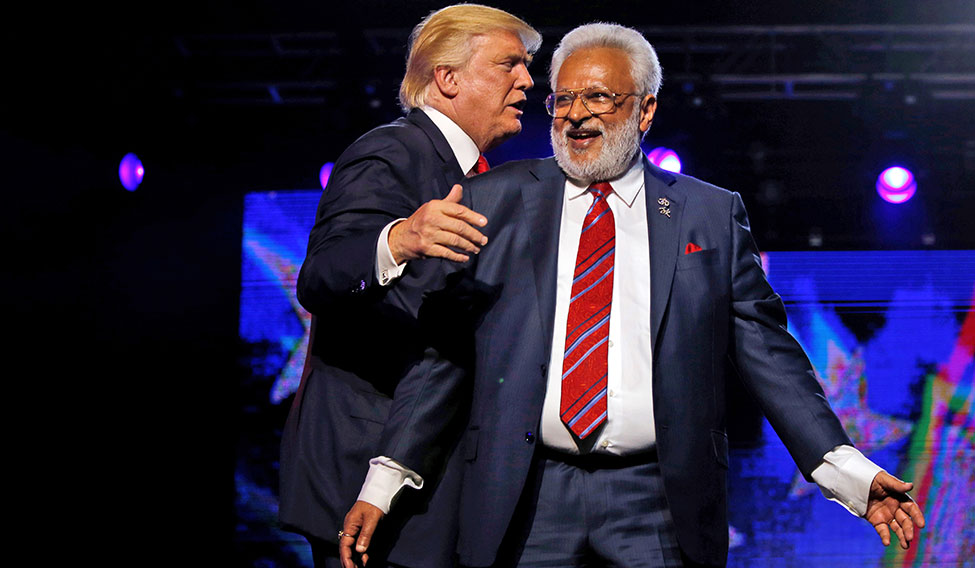It was indeed an achievement. On October 14, Donald Trump attended a fundraiser organised by the Republican Hindu Coalition (RHC) in New Jersey. It has been the only event of an ethnic group that Trump has attended ever since he announced his presidential run. The event was spangled with starlets from India and had quite a turnout of Indians who are ever ready for a dose of desi naach gaana. Trump, of course, aced the event by saying he loved “Hindu” and that India will have the best friend in White House. The event was reported with glee for people back home.
What did not get much reportage was the gathering of Indian-origin Americans outside the event, holding “Not fit to be President” and “Dump Trump” placards.
The Indian diaspora is quite small in the United States. Yet, it tends to be cliquish. The Hyderabadis stay together, the Gujaratis congregate at Swaminarayan temples, while Malayalis seek other Malayalis,
as do the Bengalis.
Yet, there is a certain cohesiveness in the diaspora, especially in their outlook towards their adopted homeland. So, while organisations like ‘Friends of BJP’ and Vishva Hindu Parishad take a keen interest in Indian elections, and while some outfits have used these shores to fuel separatist movements like Khalistan, when it comes to affiliating themselves with US politics, there is a different set of criteria.
The rule of thumb is that the diaspora is largely Democrat inclined. According to Pew Research Centre, two-thirds support Democrats and one-third, Republicans. “The new migrant comes to work, and the Democratic party is pro-labour. But over the years, when the migrant becomes a businessman, he may tend to become a Republican sympathiser,’’ explains Pawan Kumar, author and IT consultant in Atlanta. Shalabh Kumar, the founder of RHC, who has contributed loads of funds to the Trump campaign, started out as a Democrat in 1969. He turned Republican after interacting with Ronald Reagan.
But with his anti-Islamic stance, has Trump split the diaspora votes on communal and other divisive lines? Observers say there is a lot of under-voting regarding Trump supporters. So the real picture is unclear. Before his event in New Jersey, research showed that 70 per cent Indians were with Hillary Clinton, and only 7 per cent with Trump. Post the event, people feel that Trump’s espousal of “Hindu” may not have had much vote impact.
“Those who were voting Republican would have done so for any candidate from the party. In this context, Trump is not the rallying factor,” says Pawan Kumar, adding that if at all the votes have been split, it would have been in Hillary’s favour. Several people have pointed out that the hype was targeted at the audience in India, especially in the follow-up advertisement in which Trump is made to say: “Abki baar Trump sarkaar.” Scratch beneath the surface, Kumar says, and Trump’s ignorance of India is ridiculous. “He mixed up the Mumbai terror attack with the Parliament attack,” he says.
When Trump’s daughter-in-law, Lara, visited a Hindu temple in Virginia for a pre-Diwali celebration, it was again more publicity than vote garnering. The RHC is a newly minted organisation, formed on the lines of, and with help from, the powerful Republican Jewish Coalition (RJC). As of today, it does not have clout. But with Kumar himself having contributed $2 million to the Trump campaign, it didn’t hurt the businessman Trump to make an appearance at the event.
There is the undecided Indian voter—a rather slim percentage. Shalini Das, for instance, is a registered Democrat at San Jose. But she is not a fan of Hillary, who for her embodies all that is ‘stuffy’ and ‘Washington-centric’ in American governance. “Trump made valid points initially, but every time he says something now, he just makes it worse for himself,” she says. Her vote would be on informed choice, not swayed by rabble rousing.
Trump supporter A.D. Amar notes that the return of Nikki Haley to the Trump fold and Bobby Jindal’s long-standing support for the candidate are significant.
“The Trump campaign has done little to expand beyond his base,” feels Frank Islam, a Democrat fundraiser. Yet, Trump’s influence has been important enough for candidates like Raja Krishnamoorthi from Illinois—Democrat running for Congress—to say, “If a community does not have a seat in government, it is not heard. Yet, we have to reject calls from Trump and others to divide us along ethnic lines. This is the time to unite.’’
Trump had made fun of the Indian accent when mimicking a call centre worker, who has “taken away American jobs”. This was in the initial phase of his campaign. Later, he said he admired Indians and that is the stand he has taken ever since. Even during his final primary debate, it was in a tone of respect that he spoke about India’s 8 per cent growth rate.
The Indian vote bank is small—the population is only around 2.8 million, and not all are of voting age. Yet, according to the US Census of 2010, it is the fastest growing population, having jumped by over 60 per cent in a decade.
Again, just half the diaspora is actually Hindu, according to Pew Research Centre. Ten per cent are Muslim, and 18 per cent—including many prominent members like Jindal and Haley—identify themselves as Christians. The communal card can have only that much effect on a population that is so diverse, unlike the RJC, which is religion centric. A diaspora which wants to make itself an important pressure group in America knows it cannot do so on communal lines.







